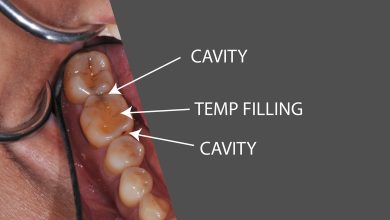Can a Decaying Tooth Kill You? The Dangerous Consequences Unveiled!

Decaying tooth can result in serious health complications and even be fatal if left untreated. Neglecting an decaying tooth can have severe consequences on your overall health and well-being.
Maintaining good oral hygiene is essential for a healthy and disease-free mouth. One common dental issue that many people face is a decaying tooth, which occurs when the protective enamel on a tooth is damaged by bacteria and acids. If left untreated, a decaying tooth can lead to various health complications, and in severe cases, it can even be life-threatening.
We will explore the potential dangers of a decaying tooth and why it should not be ignored. It is crucial to understand the importance of proper dental care and the potential risks associated with neglecting a decaying tooth. So, without further ado, let us delve into the potential risks and detrimental effects that a decaying tooth can have on your overall health.
Understanding The Consequences
Neglecting dental hygiene can have severe implications on your overall health. A decaying tooth, when left untreated, can lead to a cascade of complications that can potentially be life-threatening. The oral cavity provides the perfect breeding ground for harmful bacteria, which can spread to other parts of the body through the bloodstream and affect vital organs.
The consequences of a decaying tooth can range from mild to severe, depending on the individual and the extent of the decay. Some common health issues associated with untreated tooth decay include:
| 1. Periodontal Disease: | Untreated tooth decay can progress into gum disease, also known as periodontal disease. This condition can lead to gum inflammation, pain, and even tooth loss. |
| 2. Abscess: | A decayed tooth can develop an abscess, which is a pocket of pus caused by a bacterial infection. This infection can be extremely painful and may require immediate medical intervention. |
| 3. Systemic Infections: | If the infection from a decaying tooth spreads to other parts of the body, it can result in systemic infections, such as endocarditis, pneumonia, or even sepsis, which can be life-threatening. |
| 4. Cardiovascular Disease: | Research suggests a link between poor dental health and cardiovascular diseases, including heart attack and stroke. Bacteria from an infected tooth can enter the bloodstream, leading to inflammation in the blood vessels. |
It is crucial to prioritize dental hygiene and seek prompt treatment for tooth decay. Regular brushing, flossing, and routine dental check-ups can help prevent such complications and maintain both oral and overall health.
The Infection Connection
The Infection Connection
Bacterial growth in decayed teeth can cause infections.
Decaying teeth are a breeding ground for bacteria. When a tooth is decaying, the outer protective layer, called enamel, gradually wears away, exposing the inner layers of the tooth to bacteria. Once bacteria enter the decayed tooth, they can multiply rapidly. This bacterial growth can lead to several oral infections such as:
| Common Oral Infections Caused by Decaying Teeth |
|---|
| Dental abscess: The accumulation of pus caused by a bacterial infection. |
| Gingivitis: Inflammation of the gums resulting from bacterial plaque buildup. |
| Periodontitis: A more severe form of gum disease that can lead to tooth loss. |
| Cellulitis: A bacterial skin infection that can spread to other parts of the face and neck. |
| Ludwig’s angina: A rare but serious infection that affects the floor of the mouth and can obstruct the airway. |
It’s important to address decayed teeth promptly to prevent the risk of these infections spreading. Regular dental check-ups and good oral hygiene practices, including brushing, flossing, and using mouthwash, can help maintain the health of your teeth and prevent the potentially harmful effects of decay.
The Link Between Gum Disease And Tooth Decay
Gum disease and tooth decay are two common oral health problems that can lead to serious complications if left untreated. While tooth decay occurs when bacteria erode the tooth enamel, gum disease affects the supporting tissues and bone around the teeth. Gum disease can worsen the effects of tooth decay by creating additional avenues for bacteria to invade the already weakened tooth structure. When left untreated, gum disease can lead to tooth loss and even potentially affect your overall health.
It is important to maintain good oral hygiene practices such as regular brushing and flossing to prevent tooth decay and gum disease. Additionally, visiting your dentist for regular check-ups and cleanings is essential to identify and treat any signs of decay or gum disease early on. Taking preventive measures and seeking timely treatment can help protect your teeth and gums, ensuring a healthy smile and overall well-being.
The Role Of Plaque In Tooth Decay
The Role of Plaque in Tooth Decay
Tooth decay is a common dental issue that can lead to various complications if left untreated. Plaque, a sticky film of bacteria, is a major factor contributing to the development of tooth decay. When plaque is not adequately removed through proper oral hygiene practices, it can accumulate on the teeth, especially in areas that are difficult to reach.
This accumulation of plaque creates an ideal environment for bacteria to thrive, leading to the production of acids that can gradually dissolve the enamel, the protective outer layer of the tooth. Over time, this process can create cavities, which are small holes in the teeth.
When tooth decay progresses, it can affect the inner layers of the tooth, including the dentin and pulp. This can result in symptoms such as tooth sensitivity, pain, and eventually, infection. In severe cases, an untreated decaying tooth can lead to serious complications, including abscesses and even systemic infections that may affect other parts of the body.
The Possibility Of Tooth Abscess
A decaying tooth can pose serious risks to your health, and in some cases, it can even be life-threatening. One of the most common complications of untreated tooth decay is a tooth abscess. When decay reaches the innermost layer of the tooth, called the pulp, bacteria can invade and cause an infection. This infection can result in the formation of an abscess, which is a pocket of pus that forms at the root of the tooth.
If left untreated, a tooth abscess can spread to other areas of the body, including the jaw, neck, and even the brain. The infection can enter the bloodstream and lead to a condition called sepsis, which is a potentially life-threatening response to an infection. Symptoms of a tooth abscess include severe tooth pain, swelling, redness, and a foul taste or odor in the mouth.
If you suspect you may have a tooth abscess, it is crucial to seek dental treatment immediately. A dentist can diagnose the abscess and provide appropriate treatment, which may include draining the abscess, prescribing antibiotics, or performing a root canal or tooth extraction.
How A Decaying Tooth Can Impact Overall Health
Decaying teeth can have serious consequences on your overall health. When left untreated, the infection from a decaying tooth can spread throughout the body, causing various health issues. The bacteria from the decay can enter the bloodstream and potentially travel to vital organs, leading to severe complications.
The spread of infection can also cause inflammation in the body, which can weaken the immune system. This makes it harder for the body to fight off other infections and illnesses. Additionally, the toxins released by the decaying tooth can affect nearby tissues, leading to gum disease and potentially tooth loss.
Moreover, a decaying tooth can impact your ability to eat and chew properly, resulting in poor nutrition and weight loss. It can also cause chronic pain and discomfort, affecting your daily life and overall well-being.
It’s crucial to address dental decay and seek professional dental care to prevent further health complications. Regular dental check-ups, proper oral hygiene, and timely treatments can help maintain good oral health and protect your overall well-being.
Severe Infections And Their Potentially Fatal Consequences
Serious infections originating from tooth decay can have life-threatening effects. When tooth decay is left untreated, bacteria can multiply and cause an infection that spreads to the surrounding tissues. This can lead to a condition called cellulitis, which is characterized by painful swelling and redness.
If the infection continues to progress, abscesses may form. These are pockets of pus that develop as the body tries to fight the infection. Left untreated, an abscess can spread to other parts of the body, including the brain or the heart. Such complications can have devastating consequences and even result in death.
It is important to always seek dental treatment when experiencing tooth decay or any signs of infection. Regular dental check-ups and practicing good oral hygiene are essential for preventing severe infections and their potentially fatal consequences.
Assessing The Risk Factors
Understanding the factors that increase the risk of tooth decay-related complications is crucial. Neglecting dental hygiene practices is one prime factor leading to tooth decay. Poor oral hygiene, including irregular brushing and inadequate flossing, allows harmful bacteria to thrive in the mouth. High sugar and carbohydrate intake also play a significant role. Frequent consumption of sugary and acidic foods and beverages exposes the teeth to a higher risk of decay. Dry mouth or reduced saliva production can exacerbate tooth decay as saliva helps to neutralize acids and protect teeth against bacteria. Smoking and tobacco use contribute to numerous oral health concerns, including a higher susceptibility to tooth decay. Genetic factors such as weak enamel or overcrowded teeth can also increase the risk. Finally, age and poor overall health can compromise the body’s ability to fight off infections and repair damaged teeth.
Recognizing The Warning Signs
Can a Decaying Tooth Kill You?
Recognizing the Warning Signs
Decaying teeth can become a serious health concern if left untreated. Early identification of the warning signs can help prevent further complications. Here’s how to effectively identify common symptoms of a decaying tooth:
- Persistent toothache: Unexplained and consistent pain in a tooth can be an indication of decay. It might worsen while biting or chewing.
- Sensitivity to hot and cold: If you experience an intense sensitivity to hot or cold temperatures, it could be a sign of tooth decay.
- Visible discoloration: Discolored spots, black or brown staining, or white spots on the surface of a tooth can all be signs of decay.
- Halitosis (bad breath): Decaying teeth can contribute to persistent bad breath that doesn’t improve with regular brushing or mouthwash.
- Swelling or tenderness: Swollen or sensitive gums around a particular tooth may indicate decay and potential infection.
Don’t ignore these warning signs. If you experience any of these symptoms, it is crucial to seek dental care promptly to prevent further damage and potentially life-threatening complications.
Seeking Timely Dental Treatment
htmlA decaying tooth can have severe consequences if left untreated. Timely dental treatment is crucial in preventing these serious outcomes. When tooth decay is neglected, it can progress into various complications that can potentially affect your overall health. One significant risk of untreated tooth decay is the spread of infection. The bacteria causing the decay can penetrate the pulp of the tooth, leading to an abscess. The infection can then travel to the surrounding tissues and even spread to other parts of the body through the bloodstream, which can pose a threat to your systemic health. Apart from infection, a decaying tooth can also cause immense pain and discomfort. It can lead to chronic toothaches that can disrupt your daily life, affecting your ability to eat, sleep, and concentrate. Furthermore, an unattended decaying tooth can result in the loss of the affected tooth. This can impact your bite alignment and your ability to chew food properly, potentially leading to digestive issues. In summary, dealing with tooth decay promptly by seeking timely dental treatment is crucial to avoid these serious consequences. Remember, prevention is always better than cure, and taking care of your oral health should be a priority to maintain overall well-being.
Preventive Measures For Maintaining Oral Health
Regular dental hygiene and preventive measures are essential for maintaining oral health and preventing tooth decay. Effective strategies for preventing tooth decay include:
- Brushing teeth at least twice a day with fluoride toothpaste.
- Flossing daily to remove plaque and food particles from between teeth.
- Limiting sugary and acidic foods and beverages.
- Having regular dental check-ups and cleanings.
- Using fluoride mouthwash to strengthen tooth enamel.
- Considering dental sealants for added protection, especially for children.
- Practicing good oral hygiene habits from an early age.
When tooth decay is left untreated, it can lead to severe consequences that could potentially be life-threatening. Bacteria from decaying teeth can spread to other parts of the body through the bloodstream, increasing the risk of infection and inflammation. This can affect various organs and systems, including the heart and lungs. In some cases, untreated tooth decay can lead to abscesses, which can cause serious complications if the infection spreads.
In conclusion, maintaining good oral hygiene and following preventive measures are crucial for preventing tooth decay and its dangerous consequences. By incorporating these strategies into your daily routine, you can protect your oral health and overall well-being.

Credit: www.bbc.com
The Importance Of Regular Dental Check-ups
The Importance of Regular Dental Check-upsTooth decay is a common dental problem that can lead to serious health complications if left untreated. Regular dental check-ups play a crucial role in preventing and addressing tooth decay. Dentists are able to detect early signs of decay through a thorough examination. By examining your teeth, gums, and mouth, they can identify any potential issues and provide necessary treatment. Regular check-ups also allow for professional cleaning and removal of plaque and tartar buildup, which can contribute to tooth decay. Moreover, dentists can offer valuable guidance on maintaining proper oral hygiene and implementing preventive measures such as fluoride treatments and dental sealants. Early detection and treatment of tooth decay can help avoid more severe complications such as abscesses or infections that can be life-threatening. Therefore, it is crucial to prioritize regular dental check-ups in order to ensure the overall health and longevity of your teeth.
The Role Of Dental Professionals In Managing Tooth Decay
htmlTooth decay is a serious oral health issue that, if left untreated, can lead to severe consequences. Dental professionals play a crucial role in managing and addressing tooth decay. Through their expertise and comprehensive knowledge, they can effectively treat and prevent further decay.
Dentists are skilled in diagnosing decay through regular dental examinations and x-rays. By identifying early signs of decay, they can provide appropriate treatment options such as fillings, crowns, or root canals. Moreover, dentists can guide patients on proper oral hygiene practices to prevent decay from occurring or worsening. This includes recommending regular brushing and flossing, as well as the use of antibacterial mouth rinses.
In addition to dentists, oral health professionals like dental hygienists and dental therapists play a crucial role in managing tooth decay. They assist dentists in cleaning teeth, removing plaque and tartar, and applying fluoride treatments to strengthen enamel. Through their expertise, they educate patients on the importance of proper nutrition and lifestyle choices that can contribute to oral health.
By working together, dental professionals can effectively manage tooth decay, ensuring that it doesn’t progress to a stage that threatens one’s overall health and well-being.
The Impact Of Proper Oral Hygiene Practices
htmlProper oral hygiene practices play a crucial role in preventing tooth decay, which can have serious consequences for your overall health. By following a consistent oral care routine, you can greatly reduce your risk of developing decaying teeth.
Regular brushing and flossing are essential for removing plaque and bacteria that can lead to tooth decay. Brushing at least twice a day with a fluoride toothpaste helps strengthen the teeth’s enamel, while flossing removes food particles and plaque from between the teeth and along the gumline.
In addition to thorough brushing and flossing, regular dental check-ups and cleanings are vital to maintaining good oral health. Dentists can identify early signs of tooth decay and provide necessary treatments to prevent further damage.
It’s important to note that tooth decay not only affects your oral health, but it can also have serious systemic repercussions. When left untreated, decaying teeth can lead to infections, abscesses, and even spread of bacteria to other parts of the body.
By prioritizing proper oral hygiene practices, you are taking a proactive step towards protecting your overall well-being. Taking care of your teeth and gums not only helps prevent tooth decay, but it also contributes to better oral health and potentially a longer, healthier life.
Addressing The Long-term Effects
Tooth decay is a common dental problem that, if left untreated, can lead to serious complications. While it may not directly kill you, the long-term effects of untreated decay can have a significant impact on your overall health. Tooth decay occurs when the enamel of your teeth is eroded by bacteria and plaque. If left unchecked, it can progress to the dentin and pulp of the tooth, causing infection and abscesses. Chronic pain and swelling are common symptoms of a decaying tooth. The bacteria in the infected tooth can also spread throughout your body, leading to systemic infections that can be life-threatening. Furthermore, complications such as endocarditis (infection of the heart) and sepsis (infection of the bloodstream) can arise as a result of untreated tooth decay. Therefore, it is crucial to address tooth decay promptly and seek dental treatment to prevent potential complications. Regular dental check-ups, good oral hygiene practices, and healthy lifestyle habits can help maintain optimal dental health and minimize the risk of serious complications arising from decaying teeth.
Frequently Asked Questions Of Can A Decaying Tooth Kill You?
What Happens If Decayed Tooth Is Not Removed?
When decayed tooth is not removed, it can lead to toothache, infection, and gum disease. The decay can spread to nearby teeth, causing further damage. It is important to remove the decayed tooth to prevent complications and maintain oral health.
Can A Tooth Decay Cause Death?
Tooth decay itself does not directly cause death. However, if left untreated, it can lead to serious infections that may spread to other parts of the body, potentially affecting overall health and leading to complications. Regular dental care is crucial in preventing tooth decay and related complications.
How Long Can You Go With A Decayed Tooth?
Decayed teeth can be painful and lead to infections. It is important to seek dental treatment as soon as possible to prevent further damage.
What Happens If You Leave A Decayed Tooth In?
Leaving a decayed tooth untreated can lead to further damage and complications. It may result in pain, infection, tooth loss, and even affect your overall oral health. It’s important to seek dental treatment promptly to prevent any worsening of the condition.
Conclusion
Neglecting a decaying tooth can have severe consequences on your overall health. The bacteria present in a decaying tooth can spread to other parts of the body, leading to serious infections and even life-threatening conditions. It is crucial to seek dental treatment promptly to prevent such risks and maintain good oral health.
Remember, prevention is always better than cure.




